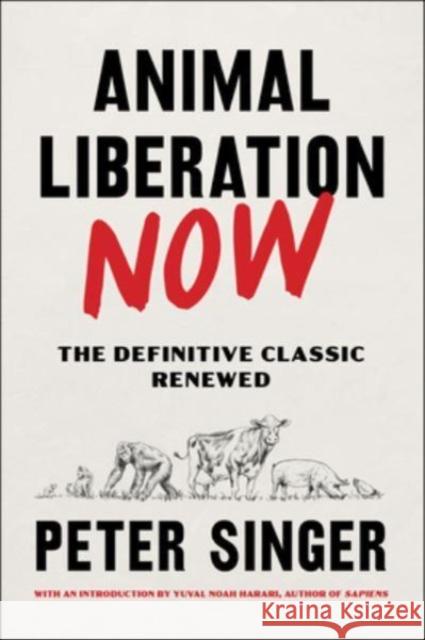Animal Liberation Now: The Definitive Classic Renewed » książka



Animal Liberation Now: The Definitive Classic Renewed
ISBN-13: 9780063226708 / Angielski / Miękka / 2023 / 352 str.
Animal Liberation Now: The Definitive Classic Renewed
ISBN-13: 9780063226708 / Angielski / Miękka / 2023 / 352 str.
(netto: 72,36 VAT: 5%)
Najniższa cena z 30 dni: 74,93
ok. 16-18 dni roboczych.
Darmowa dostawa!
"I became a vegetarian when I read Animal Liberation back in the 1970s. Then and there I stopped eating meat. If I'd read this revised Animal Liberation Now I'd have become a vegan much sooner." - Jane Goodall
"In its first incarnation, Animal Liberation became the indispensable foundational text for the movement whose name it bore. In its new, updated, and wholly rewritten form, Animal Liberation Now provides not only a survey - sober, authoritative, and chilling - of what goes on today in the factory farms and research laboratories of the world, but also a guide, written with the honesty and philosophical depth characteristic of all of Peter Singer's work, through the complexities of the modern debate on animal rights." - J.M. Coetzee, author of The Lives of Animals and Disgrace
"Peter Singer may be the most moral person on the planet. If his ruthlessly consistent altruism makes the rest of us shuffle our feet in discomfort, or even noisily disrupt his lectures, that's all the more reason to read this book." - Richard Dawkins, Fellow of the Royal Society, author of The Selfish Gene, The God Delusion, and The Ancestor's Tale
"Animal Liberation Now is a truly revolutionary text to read, treasure and pass along. Peter Singer's Animal Liberation was a philosophical bombshell when it first appeared in 1975. It forever changed the conversation about our treatment of animals, and this new book will both enrich and sharpen that conversation." - Ingrid Newkirk, founder and president, People for the Ethical Treatment of Animals
"Whether you are new to these ideas, or Animal Liberation has already changed your life, Animal Liberation Now is essential in helping us all see our place in today's world and the urgency of ending the exploitation of animals." - Leah Garcès, CEO, Mercy For Animals
"Singer's great achievement in Animal Liberation was to bring activism together with a powerful philosophical theory founded on the principle of equal consideration of interests. Animal Liberation Now shows that the book that changed the world a half century ago is even more relevant today." - Dale Jamieson, Director, Center for Environmental and Animal Protection, New York University
"The first edition of Animal Liberation helped me make a career-changing decision to establish a more egalitarian biology. Singer's updated edition is even more valuable because given what we've learned about animal minds in recent years, it is painfully clear that animals are not disposable, simple-minded, unfeeling objects. We should have got rid of that human-centric arrogance decades ago." - Marc Bekoff, professor emeritus of Ecology and Evolutionary Biology, University of Colorado, Boulder, and author of The Emotional Lives of Animals, and The Animals' Agenda
"Singer's documentation is unrhetorical and unemotional, his arguments tight and formidable, for he bases his case on neither personal nor religious nor highly abstract philosophical principles, but on moral positions most of us already accept." - New York Times Book Review
"This book is a must . . . not just for every animal lover but forevery civilized reader." - Cleveland Amory
"A most important book that will change the way many of us look at animals-and, ultimately, at ourselves." - Chicago Tribune
"This book can't help but make you think twice about whether or not animals have rights. It is so lucid and smart and thoroughly researched, without a hint of hysteria. I couldn't put it down." - Rick Moody, author of The Ice Storm
Peter Singer is widely acknowledged as the father of the animal rights movement and one of the most renowned writers on contemporary ethics. He is co-founder of The Life You Can Save, an organization that aims to help those living in extreme poverty; and Animals Australia, that country's largest and most effective animal organization. His many other books include Why Vegan?, The Life You Can Save, Writings on an Ethical Life, Rethinking Life and Death, and Practical Ethics. Since 1999, Singer has served as Ira W. DeCamp Professor of Bioethics at Princeton University's Center for Human Values. He lives in Princeton, New Jersey.
Prof. Yuval Noah Harari is a historian, philosopher, and the bestselling author of Sapiens: A Brief History of Humankind, Homo Deus: A Brief History of Tomorrow, 21 Lessons for the 21st Century, and Sapiens: A Graphic History. His books have sold over 35 million copies in 65 languages, and he is considered one of the world's most influential public intellectuals today. The Guardian has credited Sapiens with revolutionizing the non-fiction market and popularizing "brainy books".
In 2020 Harari joined forces with renowned comics artists David Vandermeulen and Daniel Casanave, to create Sapiens: A Graphic History: a radical adaptation of the original Sapiens into a graphic novel series. This illustrated collection casts Yuval Noah Harari in the role of guide, who takes the reader through the entire history of the human species, accompanied by a range of fictional characters and traveling through time, space and popular culture references.
Born in Haifa, Israel, in 1976, Harari received his PhD from the University of Oxford in 2002, and is currently a lecturer at the Department of History, the Hebrew University of Jerusalem. He originally specialized in world history, medieval history and military history, and his current research focuses on macro-historical questions such as: What is the relationship between history and biology? What is the essential difference between Homo sapiens and other animals? Is there justice in history? Does history have a direction? Did people become happier as history unfolded? What ethical questions do science and technology raise in the 21st century?
1997-2026 DolnySlask.com Agencja Internetowa
KrainaKsiazek.PL - Księgarnia Internetowa









